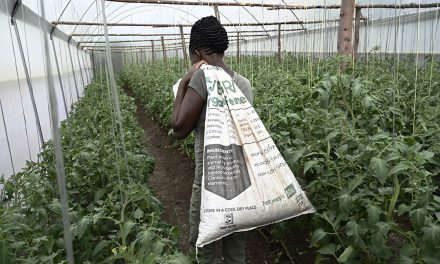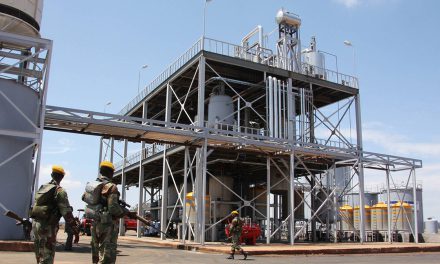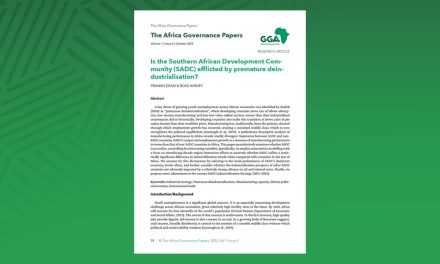This weekend, on the 9th of December, delegates convened at the “Powering Ocean Breakthroughs with 100% Sustainable Ocean Management” event at the 28th UN Conference of Parties (CoP28) in Dubai, to decide on “path-defining” nature-climate investment plans and financing strategies towards safer oceans.
The event focused on the creation and execution of Sustainable Ocean Plans (SOPs) and was intended to highlight advancements in political leadership, policy development and funding strategies aimed at safeguarding and responsibly managing critical ecosystems, with a specific focus on forests, mangroves, and the ocean. The discussions revolved around key frameworks such as the Kunming-Montreal Global Biodiversity Framework (adopted by 190 countries in 2022), the Glasgow Leaders’ Declaration on Forests (signed in 2021 by 141 countries), and the Biodiversity Beyond National Jurisdiction Agreement (signed in 2023 by 83 countries).
In a recent update from the Planetary Boundaries Framework that sheds light on Earth’s environmental status, it was revealed that six out of nine crucial boundaries for human safety and habitation have been broken. The research highlights the significant role of natural resource exploitation and overconsumption in negatively impacting Earth’s biosphere.
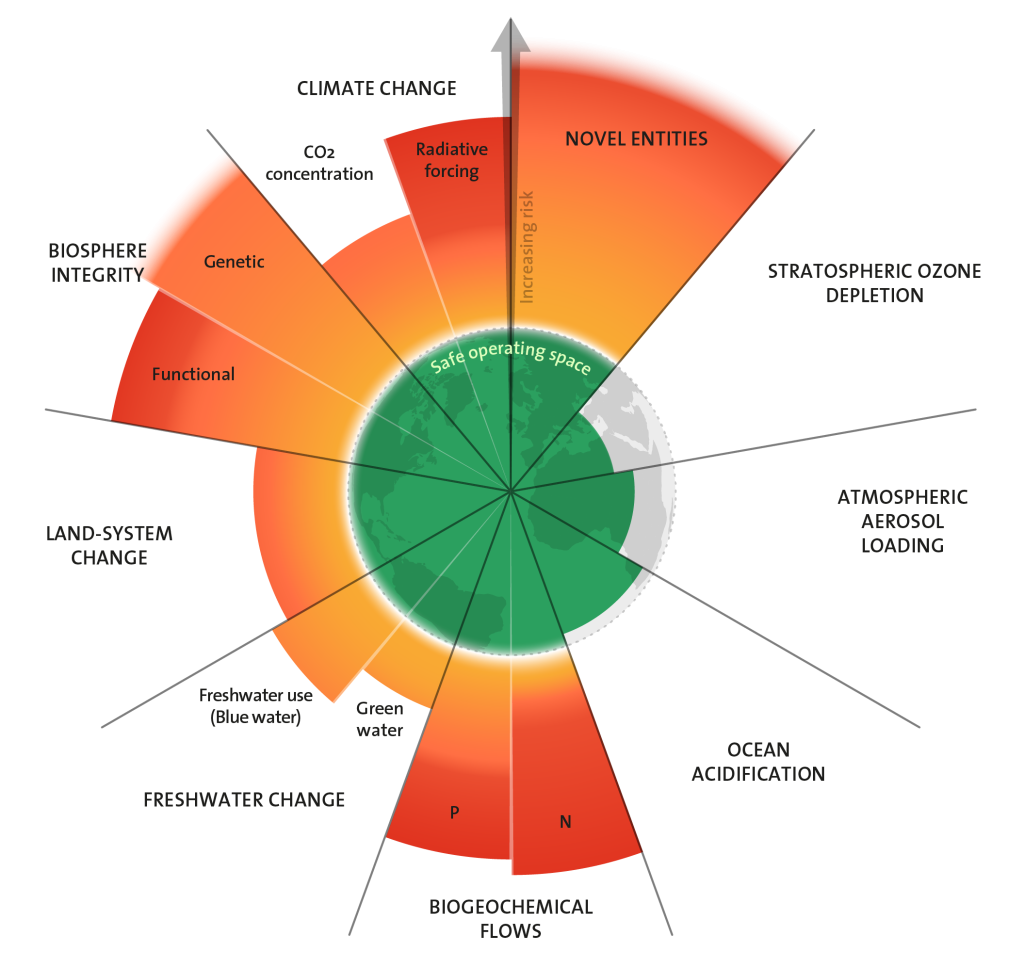
Azote for the Stockholm Resilience Centre, based on the analysis in Richardson et al 2023.
Of these challenges, pollution is a major driver of environmental degradation. Plastic pollution, in particular, has had devastating impacts on the terrestrial, freshwater and marine biodiversity upon which millions of people depend for their livelihood.
CoP28 also follows a third round of UN Intergovernmental Negotiating Committee (INC) negotiations towards the world’s first global treaty to control plastic pollution, which took place in Nairobi earlier this year. The INC emerged as a by-product committee stemming from the UN Environment Assembly in 2022. At this session, member states adopted a pivotal resolution to develop a global, legally binding commitment towards reducing plastic pollution and waste that threatens the planet’s biodiverse ecosystems and sustainability.
This resolution led to the formation of an Intergovernmental Negotiating Committee (INC). The purpose of this committee was to develop an “instrument”, like a binding treaty or agreement, related to the management of plastic pollution and waste by the end of 2024.
So far, there have been three additional sessions of INC’s. The first session (INC-1) was held in Punta del Este, Uruguay, from November 28 to December 2, 2022. The second (INC-2) was held in Paris, France, from May 29 to June 2, 2023. The most recent session (INC-3) took place in Nairobi, Kenya, from November 13 to 19, 2023, ahead of the COP28.
In Nairobi, addressing the first day of talks at the third session of CoP28, Kenyan President William Ruto stressed the 2024 deadline, stating that “2024 is only six weeks away and [there] are only two other meetings to go,” referring to the INC-4 and INC-5 set for next year.
Progress at previous summits has been suboptimal, considering the rate of plastic production and disposal. According to the OECD’s Global Plastics Outlook, the world produced over 450 million metric tonnes of plastic in 2019, and this number is set to reach around 1.2 billion metric tonnes by 2060, even in more aggressive mitigation and reduction scenarios. To get an idea of the scale, experts have predicted that by 2050, plastic will outweigh all the fish in the sea.
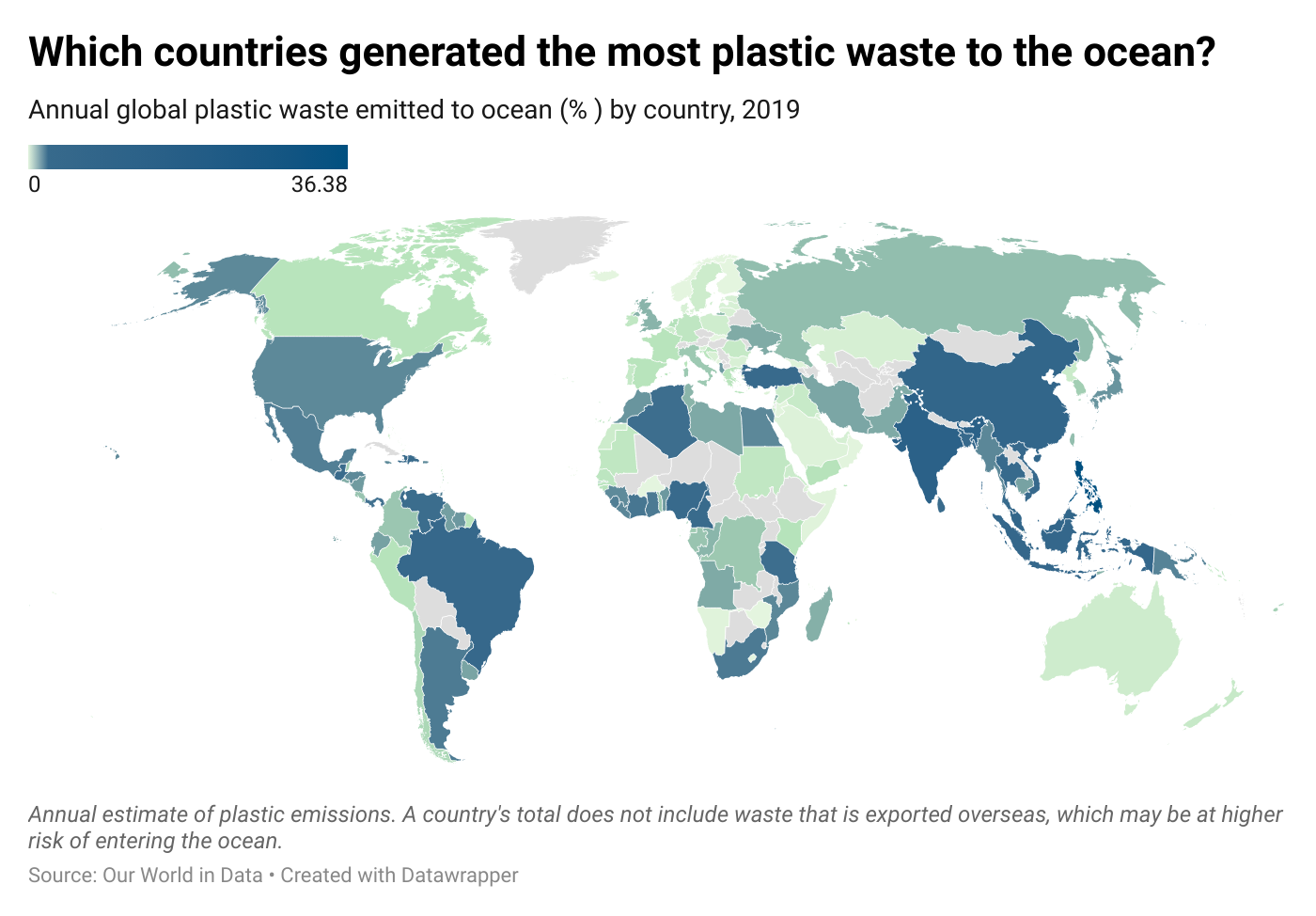
Of the 400 million metric tonnes of plastic produced annually, less than 10% is currently being recycled. The OECD estimates that about half (200 million) of the volume is used to make single-use items such as shopping bags, cups and packaging material. From these, roughly 8 million to 10 million metric tonnes end up in the ocean each year. For scale, it would take 50 thousand (50,000) blue whales (at 200 metric tonnes) to equal 10 million metric tonnes of plastic waste. According to the World Wide Fund for Nature, there are less than 25,000 blue whales globally.
Blue whales, like much of the ocean’s now-at-risk aquatic life, are an integral part of the food chain and have an important role in the overall health of the marine ecosystem. Increasing production and disposal of plastic into the ocean has led to widespread pollution, habitat destruction, and the entanglement and death of thousands of marine animals. A 2019 study by the International Monetary Fund found that whales even play a critical role in mitigating climate change by sequestering carbon through their faeces, which enhances the productivity of phytoplankton and promotes the absorption of atmospheric carbon dioxide.
What’s more, as they break down, plastics ‘leak’ harmful chemicals and break down into microplastics that ultimately contaminate the food chain for both humans and other animals. Loss of marine life also leads to economic shocks, especially in tourism and fishing industries, along with direct impacts on livelihood sustainability.
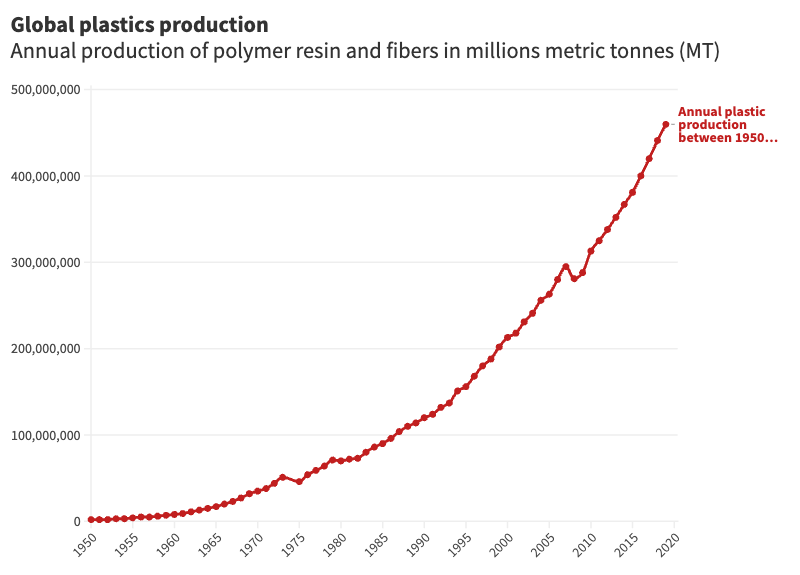
The INCs were established to develop an instrument using a comprehensive approach that considered the entire life cycle of plastic, especially its production, design and disposal. The aim has been to develop response mechanisms that would address the environmental impact of plastic throughout its entire life cycle while also focusing on reduction efforts.
INC-3 delegates discussed the Zero Draft text of the international legally binding instrument on plastic pollution, including in the marine environment, and concluded with an agreement on a starting point for negotiations at the fourth session (INC-4) in Canada next year.
It was also reported, however, that delegates in Nairobi were stalled between two options concerning policy targets. On the one hand, a wide-ranging strategy that would target plastics production or on the other, a limited approach focused on waste management.
While countries such as Kenya have supported more binding agreements, oil-rich countries like Iran, Russia and Saudi Arabia did not agree that binding cuts on production should be considered. Instead, they proposed a less targeted and lacklustre “bottom-up” approach focused on improvements to plastic recycling.
This underwhelming position adopted by politically influential nations, undoubtedly aligned with the interests of international petrochemical corporations, contradicts the views among the younger global demographic, who have consistently been the drivers of climate change action globally.
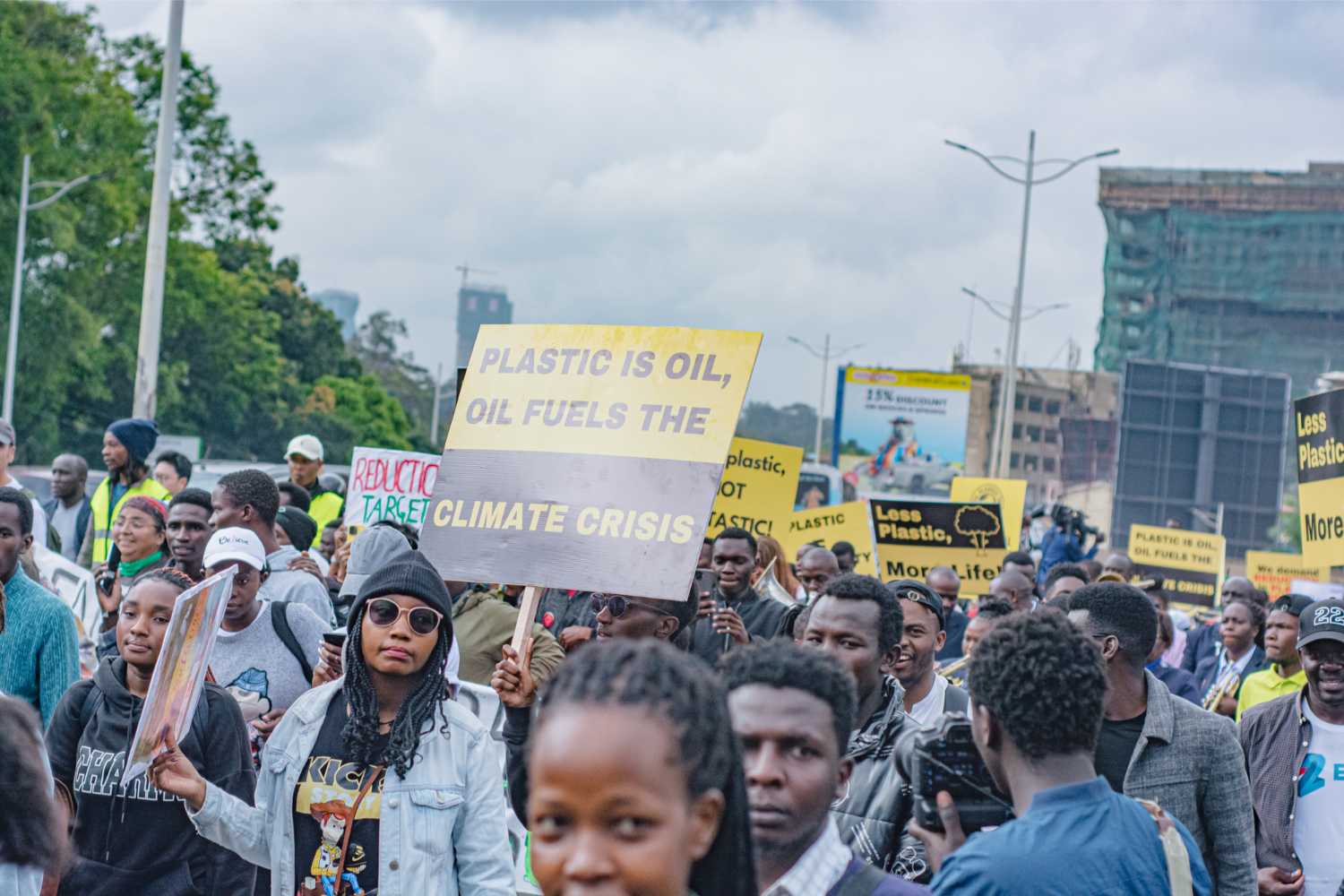
Climate activists gathered at National Museums of Kenya to lead a march to support the Global Plastics Treaty. Photo: Marete Selvin/ Greenpeace Africa.
Before the INC-3, hundreds of youth climate activists gathered at the National Museums of Kenya to lead a march that included dozens of climate groups, civil society and others to the City Park, chanting their support for a strong and ambitious Global Plastics Treaty. As part of the #BreakFreeFromPlastics movement, young activists are demanding that leaders champion a drastic reduction in plastic production.
In South Africa, according to the latest UNICEF South Africa U-Report poll, 70% of participants believed that young people can positively influence climate and environmental policy, but this requires global leaders to seriously heed their call for the world to act quickly and decisively to end the global plastics crisis.
Addressing the escalating plastic pollution in oceans necessitates a comprehensive, youth-centred approach that would ideally involve reduced consumption and production of plastics, improved waste management, recycling efforts, and the development of alternative biodegradable materials to mitigate the long-term effects of plastic consumption.
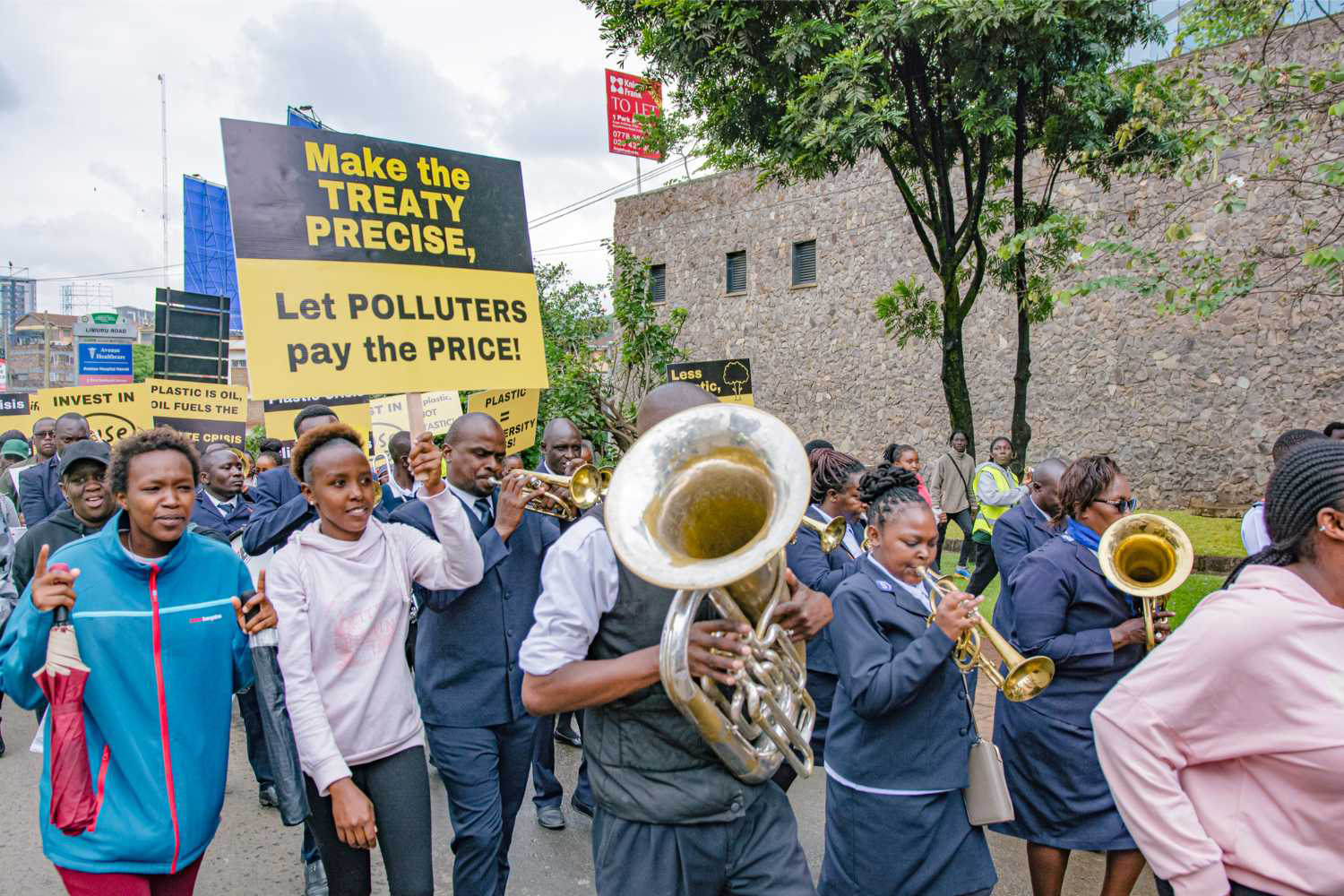
Climate activists gathered at the National Museums of Kenya to lead a march that included dozens of climate groups and civil society to show their support for the Global Plastics Treaty. As part of the #BreakFreeFromPlastics movement, young activists are demanding that leaders champion a drastic reduction in plastic production. Photo: Marete Selvin/Greenpeace Africa.
Because African countries are already some of the most vulnerable globally, and as leaders strive to improve development and governance across the continent, African political leaders must engage climate activists, especially the youth, to bridge what has been a recurring disconnect.
One thing that has become overwhelmingly evident is that progress has been too slow and negotiations have been too divisive at previous climate summits. African leaders, alongside their global counterparts, must embrace a more assertive and self-reliant negotiating stance. This involves a fundamental reimagining of climate justice to ensure accountability and pressure leaders to be accountable for the futures of their youth.
Mischka Moosa is a data journalist at GGA. She holds a Bachelor of Social Science with majors in Gender Studies and Political Science that she obtained from the University of Cape Town. Her focus of interest is on decolonial approaches to justice, development and transformation in Africa.


